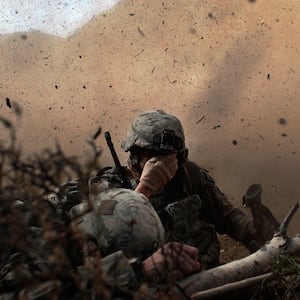The is the second of two columns about some of the lessons learned, or not, in America's longest war. The first—“Trump, Afghanistan, and ‘The Tweet of Damocles’” —can be read here.
PARIS—Unless President Donald Trump decides to end the Afghan war with a bang—with “tens of millions” killed, as he has threatened more than once—it is going to end with a whimper, if it ends at all.
“It’s not victory,” says counterinsurgency expert David Kilcullen. “It isn’t ticker-tape and Broadway.”
It should be said that what Kilcullen and others consider the best option looks like the one Trump is pursuing just now: a reduction of U.S. forces on the ground to an easily sustainable level of about 9,000, while negotiating to get the Taliban into direct talks, eventually, with the U.S.-backed Afghan government. But after 18 years of a war that has cost $2 trillion and the lives of more than 2,400 U.S. soldiers, such an inconclusive conclusion may not satisfy even an exhausted American public—much less the egotistical Mr. Trump.
As he runs for re-election touting his “promises kept,” the president is going to want something that looks like the definitive end that he's vowed he'll deliver to this “endless war.” Perhaps there will be some bit of political theater like Trump's incredibly ill-conceived and eventually rescinded invitation to Taliban leaders to come to the United States only days before the anniversary of 9/11 so he could claim his own “Camp David Accords.” Or, more likely, he’ll just pull the plug.
Thus Kilcullen’s memorable phrase, picked up from a U.S. Special Forces operator with rueful experience in Syria, “This whole operation is sitting under the tweet of Damocles.” Or, putting it another way, “Trump wakes up, he sees something on Fox and Friends, gets out of the wrong side of the bed, doesn’t like it, says, ‘Fuck it, we’re pulling out.’ And I think that’s a problem.”
In any case, the Taliban know how badly Trump wants out, and they can play with that.
But if by some miracle the current policy of minimal U.S. presence, tough talks, and supposedly unlimited patience does hold, what are some of the strategies and tactics that should be employed going forward? What needs to be done to help Afghanistan become a stable country free of terrorists who might threaten the United States or its citizens? What lessons learned from the past?
For this and the previous column, I called up both Kilcullen, a well-known Australian “soldier-scholar” who worked with the George W. Bush and Obama administrations, and Ambassador Ryan Crocker, who served as the Americans’ top diplomat in Afghanistan in 2002 and again in 2011 and 2012.
"Have you ever seen the movie I Am Legend with Will Smith?" Kilcullen asked me. I said I had, vaguely recalling a post-apocalyptic thriller and wondering where this was going.
“There’s that scene,” said Kilcullen, “where the sun goes down and he’s checking his watch because the vampires are going to come out and eat him. Well, I wish I had a dollar for every time I have been out in an Afghan district in the late afternoon with an Afghan government official, and the guy starts checking his watch. And the reason is, they don’t live there. They don’t live in the districts that they govern, because they know if they try to spend one single night in the area that they are officially in charge of the vampires are going to come out and eat them.”
Finding a way to reconnect the Afghan government with people at the local level is essential to stabilizing the country, Kilcullen suggested, and corruption made that almost impossible when the U.S. was pumping more money into the place than anyone knew how to handle:
“Vast amounts of gringo cash come into Afghanistan, that fuels an economy of corruption,” Kilcullen told me. “Instability leads to money coming in which leads to corruption which leads to abuse which leads to more people supporting the insurgents which leads to more instability, and you get this sort of self-licking ice cream cone.”
Ambassador Crocker, for his part, is quoted extensively in the U.S. government’s “lessons learned” documents recently published by The Washington Post under the damning headline, “At War With The Truth”: “Our biggest single project, sadly and inadvertently, of course, may have been the development of mass corruption,” Crocker said in 2015 when interviewed by a team from the office of the Special Inspector General for Afghanistan Reconstruction (SIGAR). “Once it gets to the level I saw, when I was out there, it’s somewhere between unbelievably hard and outright impossible to fix it.”
Over the phone last week, Crocker added, “There were no controls except our own, which obviously didn’t go far enough.” And there was plenty of corruption and waste among Americans as well. He said many thought, “Hey, U.S. rules no longer apply. Let’s get rich.”
In about 2010, Kilcullen looked at bribery among Afghan police in the south of the country. “If you wanted to be an Afghan police chief you would have to buy that position and it would cost you about 250,000 American dollars,” Kilcullen said. “And then you would have to pay every month up the chain of command all the way to Kabul about 50 grand in kickbacks... Imagine how much money you are making from bribes and shakedowns and targeting the population just to make your payment and also make a profit.”
The U.S. is still spending taxpayer billions in Afghanistan, a country of 30 million people whose entire gross domestic product is only some $21 billion. This year military aid amounts to about $5 billion, while foreign assistance to civilian projects is about $633 million—still big numbers, but less than half of what they were a decade ago.
Looking back, Kilcullen said that of $133 billion in reconstruction funds all told, “I’d say conservatively 20 to 30 percent went directly to the enemy. It was bad. But we’re not doing that anymore. It’s a historical ‘lessons learned,’ but it’s not relevant to now.”
“The investment we have in Afghanistan now is perfectly tuned,” said Crocker.
But what of the local corruption? The shakedowns, the intimidation—the kind of thing that Kilcullen witnessed with the police and with regional officials looking at their watches in the late afternoon? His answer is surprising.
Until “local government people are capable, respected, effective,” Kilcullen said, the disconnect from the local population is not going to be solved. “And frankly the only way I can see that happening in much of the country is for those local government people to effectively be Taliban. That’s a side effect of a successful political process, whereby you integrate Taliban into the structure.”
The common rap on the Afghan National Army is that its soldiers don’t want to serve, and they don’t fight. There, too, corruption has been a huge problem with officers pocketing the salaries of troops who aren’t required to report for duty, so-called ghost soldiers. But the real problem is the casualty rate among those who do fight and do die: some 45,000 killed since 2015 as opposed to fewer than 60 American troops.
“The problem is not that we can’t sustain it,” said Kilcullen. “The problem is that the Afghans as they are currently fighting cannot sustain it—they can’t sustain their own loss rate.” Among the reasons: “We did not put enough effort soon enough into the Afghan Air Force, so we started that very late in the game. And they are still very reliant on air power for things like medical evacuation, reconnaissance, battlefield transport, that kind of stuff, and they find it really hard to fight without those assets.”
To make matters worse, says Kilcullen, the campaign against the so-called Islamic State in Syria and Iraq diverted many of those resources.
There are ways to lower the loss rates among the Afghan National Army and Afghan National Police, says Kilcullen. “But again, it’s all moot, because if the president wakes up and says, ‘Fuck it, we are leaving,’ you’ve got to struggle to execute that strategy.”
Afghanistan has become the world’s biggest producer of opium. It produces some 80 percent of the world’s illicit supply, despite $10 billion spent trying to eradicate or replace the poppy crops. The Taliban make a lot of money in the narcotics business, but they are not the only players.
What can be done better? Kilcullen proposes some unconventional solutions since the conventional ones have been such stunning failures.
“I think it was a mistake to send our ground troops in a counterinsurgency role, including the Afghan troops, out to support counter-narcotics,” says Kilcullen. “If you are doing a counterinsurgency campaign and you are told you need to be eradicating poppy crops you will eradicate the crops that you can get to, which by definition will be the crops that are in accessible areas, which by definition means they are more likely to be crops owned by people who are broadly pro-government. So you are actually creating an incentive for people not to back the government and to back the insurgents, because that keeps the [Afghan National Army] out of their area and their crops aren’t going to be destroyed.”
“The other thing is I think we blame the farmer too much,” he said, offering a little paean to what he called the “amazing” poppy. “It’s a medicine that is traditional in Afghanistan that people use to treat their kids. It’s a product that keeps forever, it requires no refrigeration and never goes bad. It’s tradable for currency and is the closest thing to hard cash in large parts of Afghanistan. And more importantly it grows on any piece of broken ground. It doesn’t require a lot of water. It doesn’t require any fertilizer, unlike virtually any other crop in Afghanistan, and the customer will pay you for it up front and pick it up from the farm gate. It’s basically a perfect crop.”
“By targeting the farmer,” says Kilcullen, “you are pissing a guy off for just being logical and trying to follow his own interests. A much better way to think about dealing with it is interdiction, or—there was even an NGO in Afghanistan for years that put forward the entirely sensible policy that we should just buy all the opium, and pay the farmer a fair wage for it, and send it into a government-controlled monopoly. Then we can always just burn it out at sea if we wanted or we could feed it into the [legitimate] international economy. But we should take over and control the economy of opium rather than let the Taliban turn it into support for the insurgency.”
If there is general agreement that negotiations with the Taliban are desirable, the question of who should do the talking is not so clear. Several sessions of U.S.-Taliban negotiations in Qatar over the last year were conducted without any participation by the Afghan government at all. U.S. Ambassador Zalmay Khalilzad hammered out an agreement that would have included the staged withdrawal of all U.S. troops (an "evacuation," as the Taliban put it) and only then were they going to consent to talk with the government of President Ashraf Ghani. The result was the Camp David fiasco. Now talks have resumed, but they’re on again and off again.
The Taliban conceded early on that they would not be harboring terrorists like al Qaeda or the South Asian version of the Islamic State, but that's a matter of self interest. Such groups now compete with the Taliban for radical Islamic cred and help to divide its already fractious organization. Trump may eventually hold up such a promise as a mission-accomplished moment—once again he has defeated terrorist. But how can Taliban promises be verified if there are no more Americans on the ground?
The Afghan government could complicate such a deal by demanding something more solid than the flimsy exit pass being discussed thus far. So, Crocker said he’s not against negotiations. “I just profoundly believe that negotiating without the Afghan government is surrender.”
What Kilcullen calls a “theoretically viable strategy” is to make clear to the Taliban in no uncertain terms that “there is no timeline, that we are not leaving, and that they can’t wait us out.” At the same time, concentrate on developing the intelligence and aviation abilities of the Afghan forces, with less emphasis on U.S. airpower. “We’ve been trying to bomb the Taliban to the negotiating table,” said Kilcullen. “That’s killing a lot of civilians.”
The better strategy, he suggests, is to say convincingly, “You want us to leave? Until you guys are willing to negotiate a deal we are not leaving. I think there is a way to wait them out as opposed to bombing them to the negotiating table.”
But all this is theoretical because “we have a chief executive problem,” said Kilcullen. Around the world, Trump's threats of fire and fury are not taken seriously at this point, and neither are his promises of patient, persistent commitment, especially in Afghanistan.
“I think absent President Trump you could make the case, and I think you could probably make it in a way that the American people would understand.” U.S. casualties are very low, spending is way down, life has improved for many Afghans living in the cities, and especially for Afghan women.
“Let’s be clear,” Crocker wrote in a Washington Post op-ed last Friday. “We came to Afghanistan and remain there now for one essential reason: the United States’ national security.” But what serves that interest? “I have argued that a better life for people in a misgoverned country is an essential part of that effort. It is also about American values. What is it, exactly, about nation-building that we must avoid at all costs? Does it extend to looking in the eyes of a hopeful Afghan girl of kindergarten age and saying, ‘Sorry, kid. You’re on your own’?”
In the mercenary age of MAGA, sadly, talk about defending American values abroad has come to sound almost naïve, but that is one thing Crocker, after service as a top diplomat in Lebanon, Syria, Iraq and Afghanistan, is not.
“What scares me about Trump,” Crocker told me over the phone, “is when he gets something in his mind, he can get beaten back, but it will come at you again. He doesn’t drop it. And we saw that in Syria.” Trump wanted to get all the U.S. troops out of there—only a few thousand—and he reconsidered after Defense Secretary James Mattis and Special Envoy Brett McGurk resigned a year ago. The military meanwhile were telling him the move was “dog-ass dumb,” as Crocker put it. “But then boom, 10 months later he is back at it again. That’s where he is on Afghanistan, and I am really afraid he is going to pull the plug.”
Crocker pointed to the recent prisoner swap with the Taliban. An American and an Australian hostage were traded for three Taliban prisoners. Trump tweeted: “Let’s hope this leads to more good things on the peace front like a ceasefire that will help end this long war. Proud of my team!” But one of the released Taliban, Hajji Mali Khan, is reputed to be among their best field commanders.
“So we let this guy loose with no ceasefire,” said Crocker, “and our guys are going to die. I think it speaks to the fact this White House just wants to get the hell out.”






